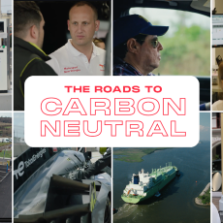The Roads to Carbon Neutral - Season 5 - Episode 5 - The Future in Flight
The Roads to Carbon Neutral - Season 5 - Episode 5
The Future in Flight
The Roads to Carbon Neutral
The fifth season of our program entitled “The Roads to Carbon Neutral”, in partnership with CNBC Catalyst, provides an insight into the solutions and innovations making the transition to low-carbon energy a reality and helping us with our net zero approach, together with society. These powerful on-the-ground stories are led by TotalEnergies’ employees.
For this fifth episode, Simon Pouilly, International Sales Manager at TotalEnergies, provides us with some insight into SAF (Sustainable Aviation Fuel), a major driver for reducing CO2 emissions in the aviation sector. The Company is taking action to meet the strong demand from the aviation industry to reduce its carbon footprint, thereby supporting its customers in achieving their ambitions. A prime example is Air France-KLM, with whom the Company has signed a major deal to deliver up to 1.5 million tons of SAF over ten years. Antoine Laborde, Head of Fuel Procurement at Air France-KLM, shares his insight into the role that SAF can play in the aviation industry and its importance to the Company’s transition strategy.
Simon Pouilly, International Sales Manager, TotalEnergies: I’ve always been fascinated by planes. In my head, you know, I said one day I will work close to the airlines. And now for two years I've been working in the aviation sector. I do care about the future. I think we all have to find a solution for lower emission energies. Energy is not just about fuel. It's about people, progress and finding the right balance. Reusing used cooking oil and animal fats will be part of this journey. My job is about selling sustainable aviation fuel, which is known as SAF, to the aviation sector. The key part of my role everyday is to respond to the needs of the clients. To work together with them to find solutions and reduce their carbon emissions. Aviation is evolving. What do you think about the partnership between TotalEnergies and Air France?
Antoine Laborde, Head of Fuel Procurement, Air France-KLM: Sustainable aviation fuel is starting to play a bigger role in the industry. In 2024, Air France-KLM bought around 100,000 tons of SAF, making Air France-KLM one of the biggest buyers of SAF of all of world airlines. As you know, aviation is under strong pressure in order to reduce its CO2 emissions. And yet, in 2024, just 0.3% of total aviation fuel was SAF. So it’s very important that all together, the airlines but also the fuel producers, will bring this knowledge, will communicate the importance of SAF so that we can reach our sustainability ambitions. Let me show you, come. The great thing about SAF is that you don’t need to change the aircraft, or to change the engine, or anything in the airport, and you get the CO2 benefits of using SAF.
Simon Pouilly: TotalEnergies is a global integrated energy company, primarily producing hydrocarbons while expanding its investment in lower carbon energies like sustainable aviation fuel. Welcome to the CRES. Sustainable aviation fuel incorporates renewable carbon like biogenic waste and organic waste coming from used cooking oil or animal fats. Today, aircrafts can be fueled with a mix of SAF and conventional fossil fuel up to 50% of the total blend. At the lab, we are working for the next generation of production based on agricultural waste and potential ethanol intermediates. Grandpuits used to be an oil refinery and TotalEnergies is investing to transform it to become a biorefinery. It will produce up to 230,000 tons of SAF per year from 2026. SAF reduces the life-cycle CO2 emissions by at least 65% compared to its fossil fuel equivalent.
Antoine Laborde: TotalEnergies will supply us with up to 1.5 million tons of SAF over the next 10 years. The commitment and consistency of TotalEnergies is at the heart of this great partnership.
Simon Pouilly: The world is changing and it’s on us to change with it. This partnership is one of the biggest at this time. It has to show an example to others. SAF is a step in the right direction. This is not just about fuel. It’s how we chose to move forward.
SAF for decarbonizing air travel
Sustainable aviation fuel, or SAF, heralds a major step forward for the aerospace industry. This fuel is produced from waste and residues from the circular economy. It is one of the keys for achieving a swift and significant reduction in greenhouse gas emissions from air transport, which currently accounts for over 2% of global emissions. Committed to an approach of getting to net zero, together with society, TotalEnergies is producing and distributing SAF to support its customers in the aviation industry with their decarbonization strategies. We are investing in transforming our refineries and developing SAF production units, and we are also forging partnerships with key industry players, such as Airbus, Safran and the Air France-KLM Group.
SAF at TotalEnergies: Key Figures
How TotalEnergies produces SAF
At TotalEnergies, we have two preferred methods for producing sustainable aviation fuel (SAF):
- The first method involves producing SAF in a biorefinery. It is then delivered to a dedicated storage facility and blended with standard JET A-1 fuel in an amount of up to 50% to produce alternative aviation fuel containing SAF.
- The second method is known as co-processing, which involves the insertion of bio-based feedstock into traditional refinery units in addition to the usual fossil feedstock. At the end of the refining process, the result is an alternative aviation fuel, already blended.
TotalEnergies, a SAF pioneer
For over 10 years, we have been pioneering in SAF. We are developing co-processing in our refineries and have invested in converting some of our facilities into biorefineries. The Grandpuits biorefinery is a prime example. Thanks to a €500 million investment, TotalEnergies is transforming its site into a zero-crude platform, including a biorefinery with a production capacity of 230,000 tons a year of SAF in 2026.
Other refineries and biorefineries in France, Belgium and Germany, such as the La Mède, Normandy and Antwerp facilities, are now producing SAF, and the Company is examining plans to build several SAF production units at its sites.
TotalEnergies is also continuing its R&D efforts, especially in feedstock, which remains one of the challenges to increasing SAF production. This is one of the topics addressed by the Solaize research center near Lyon, where specialized teams are working to continually enhance sustainable aviation fuels.
The world is changing, and we need to change with it. This partnership is one of the most important of its kind. It needs to set an example for others.Simon Pouilly International Sales Manager, TotalEnergies
TotalEnergies and Air France: committed to decarbonizing air travel
The aviation industry is committed to reducing its carbon emissions. Nevertheless, SAF only accounted for 0.3% of all fuels used in 2024. Therefore, it is vitally important for airlines and the energy industry to work hand in hand in helping drive down the sector’s emissions.
One of the main advantages with SAF for the aviation industry is that it requires no modifications to aircraft or airport infrastructures.
In 2024, the Air France-KLM Group purchased around 100,000 tons of SAF, making it one of the world’s largest customers for sustainable aviation fuel. In addition, TotalEnergies and Air France-KLM signed an agreement in 2024 for TotalEnergies to supply up to 1.5 million tons of sustainable aviation fuel to Air France-KLM Group airlines over a 10-year period, until 2035.
The Roads to Carbon Neutral
TotalEnergies is a global integrated energy company that produces and markets energies (oil and biofuels, natural gas, biogas and low-carbon hydrogen, renewables and electricity) and is committed to the energy transition.






















